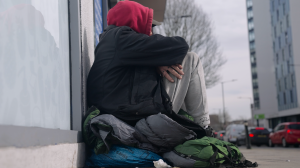
Autism is disproportionately over-represented in homeless populations. However, little is known about how autistic people experience homelessness and how best to support them.
My research examined the factors which increase risk of homelessness for autistic people, autistic people’s experiences of homelessness, and barriers to service engagement. The research found that autistic people are at increased risk of homelessness due to the social and economic disadvantages they face throughout their lives such as low educational attainment, difficulties finding and maintaining employment, and social exclusion. Once homeless, support services were often inaccessible or unsuitable. The impact of autism on day-to-day life was not recognised by housing offices. If participants were found eligible for support they were housed in over-crowded and confrontational hostels which aggravated social anxiety and sensory processing difficulties.
Improving services
Working with two local organisations, Bristol Autism Spectrum Service (BASS) and Golden Key, we created an autism and homelessness working group, with the aim of improving local services for autistic people experiencing homelessness.
I also received an ESRC Impact Acceleration Grant to produce a film based on the lived experience of my research participants.
In July, we hosted an event for local stakeholders from homelessness and health services and Bristol City Council.
The event featured:
- The launch of the film highlighting the experiences of autistic people who have experienced homelessness in the South West of England, followed by a presentation on how autistic people may experience homelessness more generally and barriers to service use (Dr Beth Stone).
- Presentation of the Autism and Homelessness Toolkit, aimed at improving access to, and engagement with, homelessness services for autistic people (Dr Alasdair Churchard).
- Autism awareness training provided by Bristol Autism Spectrum Service (BASS).
Discussion in feedback groups indicated ways in which support services planned to adopt autism friendly ways of working into their everyday practice.
View the film launched at the event here.
Next steps
We are putting together a proposal aimed at improving local service provision for autistic people who are experiencing homelessness.
Feedback from discussion groups at the awareness event has helped to shape our proposal, which we will discuss with autistic people with lived experience of homelessness. We will then use the proposal to advocate for wider changes to policy and support services.
Related publications:
Stone, Beth. 2022. “Homelessness as a Product of Social Exclusion: Reinterpreting Autistic Adults’ Narratives through the Lens of Critical Disability Studies.” Scandinavian Journal of Disability Research 24(1), 181–195. DOI: https://www.sjdr.se/articles/10.16993/sjdr.881/
Stone, B., Cameron, A., Dowling, S. 2022. “The autistic experience of homelessness: Implications from a narrative enquiry”. Autism (1-11), DOI: https://doi.org/10.1177/13623613221105091
This blog post is also available on the School for Policy Studies’ blog.
